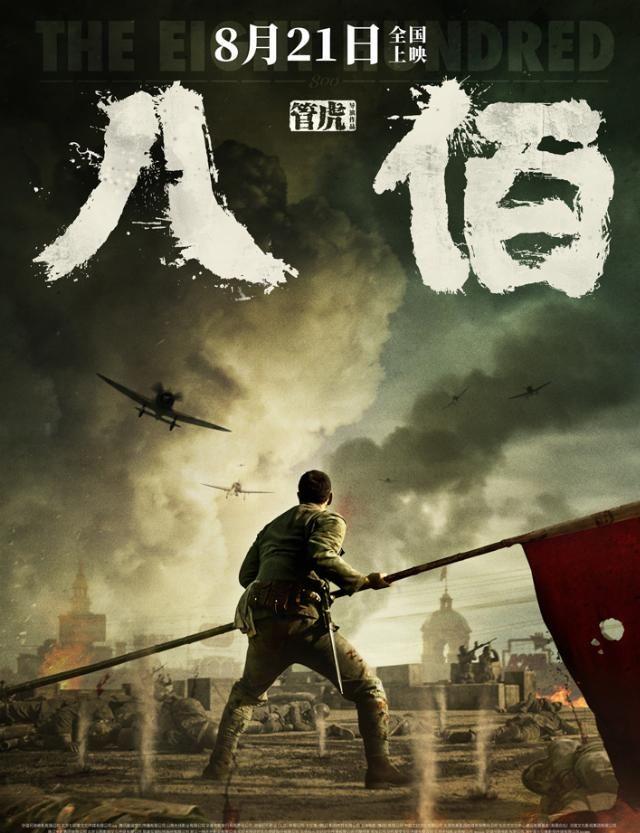Eight hundred film review: If tianruo lives ruthlessly to old age, Guan Hu's spring and autumn dreams
The Chosin Lake's Shuimun Bridge continues to be screened, and in recent years, the main theme of small campaign films has swept the film market with a sudden trend. Looking back at the beginning of the theater, the film that opened such a movie boom should be the four-line warehouse battle of Guan Hu's "Eight Hundred". And Yaobai and Watergate Bridge also have a high degree of similarity between the film narrative style and the core of the film.

Movies are emotional, and they can be said to be ruthless. For example, Guan Hu said that I am ruthless, so this second, you don't even know what the name of the sacrificed warrior is.
In the past, the story of the Sihang Warehouse was only in the history books and related reports, only to know that it was tragic, very tragic, and it killed every human life, just to protect a little face. But Guan Hu added a little romance in addition to the tragic, which is a bit like the rock sugar added to the hot pot base, which will not change the taste of the entire hot pot, but it can make the taste softer, so that you can still remember the length of the spicy taste after a long time, so that this tragic touch continues longer, into people's hearts, half a point can not be released.
In terms of plays, Guan Hu still prefers ruthless plays. Throughout the film, there are a large number of bright characters, Zheng Kai holding explosives to blow up the bunker, or the Sichuan knife delivering the telephone axis on the bridge. All the characters came and went in a hurry, and Guan Hu seemed to be in a hurry, so anxious that he didn't have time to explain the ins and outs of each of them. Without telling why he dared to sacrifice, without mentioning where he came from, not even his name, a few strokes, which makes the film not look like an image of ancient hauntings, but like a history book, skipped and only tells you what they did. Later, when interviewing director Guan Hu, he also said calmly that most people in that era were like this, you don't know their names, you don't even know where they came from, but they just do enough touching things, and then dissipate in front of you like fireworks.
He always respected historical facts, respected the truth, so cruel and ruthless that it was outrageous.
The battle of the Sihang Warehouse is a spectacle in the history of war, it is too close to the concession, so close that you can always see the flesh and blood blurred corpses through the glazed tile windows of the concession, and see the bullets flying everywhere, so Guan Hu specially designed a bridge, or a bridge on the play. This bridge connects the four rows of warehouses and concessions, and in a little cheesy terms, it is a thought of heaven and a thought of hell, on the one hand, the quiet years, on the other hand, the purgatory on earth, all through this bridge and this river.
And the advancement of the plot is also very dependent on the bridge and the river, the growth arc of the character of Ou Hao is from several times of smuggling, he is not a hero this time, is an ordinary ordinary person, can not shoot and kill people, just want to take Xiao Hubei to live, but when he swims in that river, behind the war, in front of the concession, he still chose to go back. The difference between living and living is also between a single thought. Referring to the scene of the ending, the death was tragic, and countless lives died violently on that bridge before the cameras of foreign media, and also died before the outstretched hands of compatriots, a bridge that became a chasm that could not be broken, could not be crossed, could not live, just like war.
In movies, the imagery of the bridge has always been widely used, but it is rare that almost every important plot point like "Eight Hundred" takes place on the bridge. And Guan Hu also handled such a plot twist very skillfully and naturally, as if every time it was just a coincidence, under countless coincidences, a battlefield became a play on the other side of the bridge, played for the Chinese people, a play for foreigners.
Soldiers are actors, death is a long-decided ending, only sooner or later, no yes or no, so they are doomed to be unable to cross that bridge, and the people in the play are inseparable from the stage. Saying this may seem very ruthless, just like a movie, the ruthless lens mercilessly records the tragedy of the war, the indomitability of the Chinese, the cruelty of the Japanese invaders, this drama was really staged in the past year, and after nearly a hundred years it has become a movie in front of our eyes, and once again staged, the core of the appeal is still similar, the indomitability of the Chinese spirit, the cruelty of the war.
It's always merciless, and drama is always relentless.
If the sky is old, then if the sky is ruthless to live to old age, more often we do need such a film lens, we need martyrs who sacrifice without names, to stage everything that has happened again, and put it bluntly in front of people.
Because only then is it more direct and powerful.